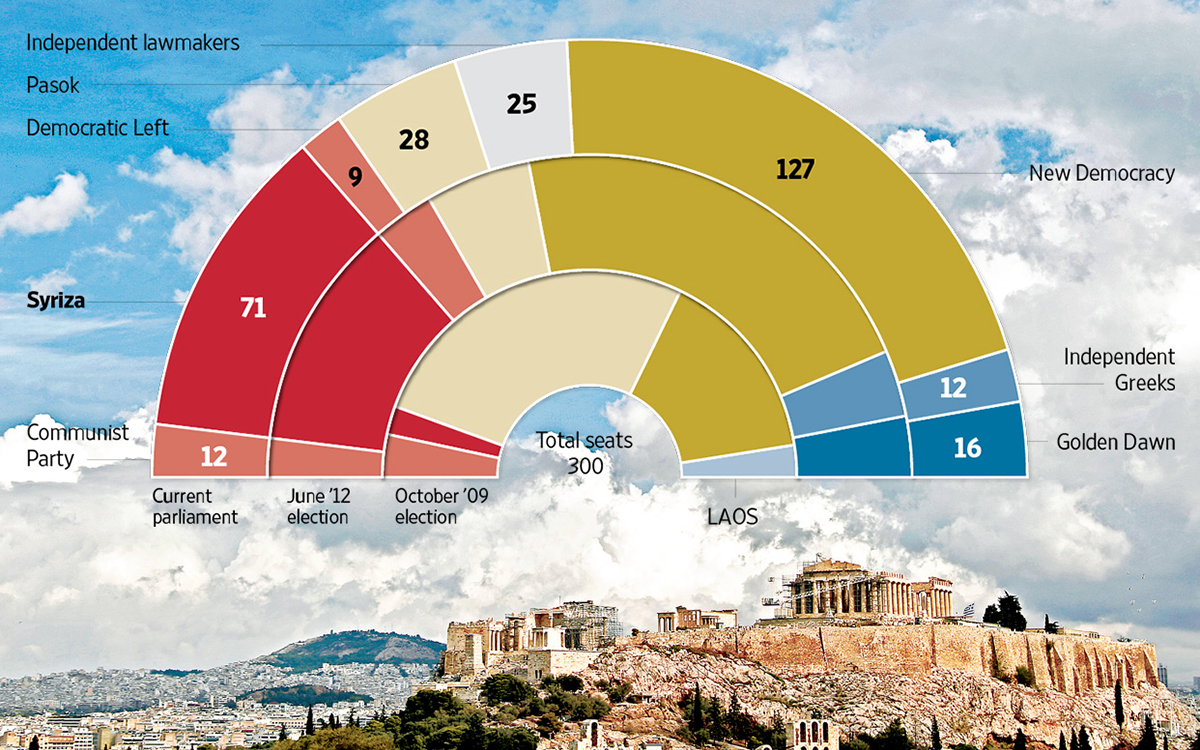
The Syriza party is positioned to win Greece’s elections Sunday on a progressive platform to reverse savage austerity cuts imposed on the country over the past half decade. By reclaiming democratic sovereignty over its economy, Greece could end a humanitarian disaster and shake the foundations of the Europe-wide austerity project.
Since the first bailout in 2010, the Troika – the European Central Bank, European Commission and IMF – has effectively dictated Greece’s economic policy, decimating its economy to levels arguably worse than the 1930s Great Depression in the U.S.
The Troika has enforced austerity, claiming that Greece should repay its creditors – despite the fact that these debts originated from private banks complicit in the global financial crisis. The country has also suffered from the structural design of the Eurozone. The Greek bailout effectively paid the country's creditors, while less than 10% of the money reached the people of Greece.
Syriza has shifted its position from the last election in 2012, when it stated it would withdraw Greece from the E.U. and default on its debts. Now, the left-populist party headed by Alexis Tsipras wants to audit the country's debts and discuss the consequences of cutting those debts to reduce Greece's debt servicing burden. By ending austerity as we know it, Syriza promises to take measures that alleviate poverty and push public programs to increase employment.
With hours left before the vote, Syriza is now the focal point for the European austerity debate. Looking ahead, the focus will shift to Spain in December, where another left-populist and pro-democracy party, Podemos, is climbing steadily in the polls and gaining widespread public support. Other anti-austerity parties competing for political power are rising in Cyprus, Portugal and Slovenia.
In reaction to Syriza’s popular electoral platform, European elites are nonetheless queuing up to assert there are no alternatives.
“The election won't change the basic conditions [of austerity]," asserts German Finance Minister Wolfgang Schäuble. "Whichever government it is, whoever wins the election, must see that Greece – with a lot of solidarity from Europe – will continue on this path. A lot of progress has been made.”
Finland’s Prime Minister Alex Stubb agrees: “It is clear that we would say a resounding no to forgiving the loans… these ideas are simply unacceptable for Finland.”
But new E.U. rules contradict the warning that Greece cannot challenge the Troika. Critical academic Éric Toussaint highlights how a May 2013 regulation enabled debt audits to uncover which debts are illegal and should be cancelled. Toussaint suggests an audit of the kind that Syriza is proposing would demonstrate why, under the Troika, Greece’s debt-to-GDP ratio increased from 113% to 175%.
A major factor was socializing the costs of private bank debts that were lent "recklessly by foreign banks," he said. Toussaint also accused Antonis Samaras, Greece's current prime minister, of effectively concealing the facts about the country's debt from Greek citizens.
Now, a project of fear is being orchestrated against Syriza's likely win, in Greece and across the E.U., according to Toussaint.
“This campaign against the supposed dangers of Syriza is aimed at intimidating Greek voters into renouncing their right to change. It is also intended, in the event of a Syriza victory, to cause part of European public opinion to reject the Greek Coalition of the Radical Left in order to avoid Podemos winning the autumn 2015 Spanish elections in its wake,” he said.
PM Samaras appears to substantiate these claims. He said of Syriza, “They are leading us to a clash with our lenders, to bankruptcy, to an exit from the euro.”
But economist Costas Lapavitsas makes the point that continuing with austerity will only make a disastrous situation worse, since Greece’s economy is already bankrupt. Lapavitsas suggests Syriza’s ideas are neither radical nor revolutionary, but “represent modest common sense and would open a fresh path for other European countries.”
He predicts that if Syriza wins it will face massive hostility from the E.U. to any adjustment of its debts – though he notes that the idea is now gaining momentum in unexpected quarters, like a Financial Times article this week calling for Greece's debt cancellation. The article reported that Benjamin Freidman, "esteemed economic historian," told a room full of European bankers that Greece should be treated the same way West Germany was treated by its creditors in 1953.
In that year's London Conference, Germany had half its debts written off, including public and private debt. Germany was forced to pay only 3% of its export earnings to service the debts – something that encouraged Germany’s export economy to grow. These ideas are similar to Syriza’s proposals today, where Greece would currently pay far higher levels than 3%.
Even more surprising, the FT article suggested that when debts spiral out of control, they should and can be written off – which has happened throughout history.
“Syriza’s proposals for a European conference are positive as this would bring everyone together," Jonathan Stevenson, of Jubilee Debt Campaign UK, told Occupy.com. "So it recognizes the problem is not just about Greece, but is a problem across the Europe that needs a collective solution.”
How significant would a Syriza victory on Sunday be in the context of austerity politics in Europe?
“It will be the first serious opposition that the Troika has had to its flawed and unjust plans to deal with the debt crisis,” Stevenson added, saying a win for Syriza could galvanize movements in the other European countries – both against austerity and for debt renegotiation.
“This will be just as important if Syriza gets into power as [it has been] during the campaign. There will be a media propaganda war, with one side asserting all the racist myths against Greece that justified the Troika in the first place," he said. "A large section of public opinion across Europe will be informed by this media battle, so it is vital that they know key points – such as how Greece's citizens did not create the debt in the first place, and the bailout loans mainly went to bankers in other countries.”
3 WAYS TO SHOW YOUR SUPPORT
- Log in to post comments














